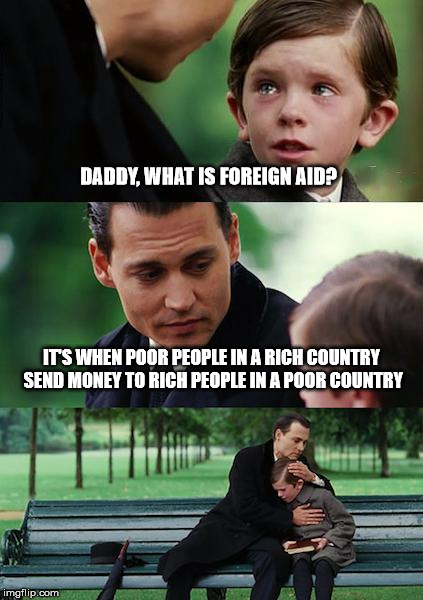
Over the past 100 years, foreign aid structures that began with European colonialism have become tied to shifting economic and political interests, as well as a growing humanitarian movement. Keri Phillips investigates the competing motives behind foreign aid, and how emerging global powers are changing the game.
An ideological battle has been playing out for decades over whether foreign aid should be used to facilitate economic growth, or to provide programs that directly meet people’s basic needs. As new global powers emerge as donors, a third 'horizontal' structure is now being discussed, based on mutual self-interest.
Rich countries started giving money to poorer countries in the 19th century, and by the 1920s and '30s countries like Germany, France and Britain were providing regular aid to their colonies in Africa, Latin America and Asia. Colonial powers used their money to build infrastructure—ports, roads, railways—and wealthy American industrialists were also involved in development aid through the Ford and Rockefeller Foundations.
Even after the colonies gained their independence, foreign support continued to focus on economic development, says author and academic Rosalind Eyben.
'There was the idea that countries had to catch up, that Western Europe and countries like Australia, Canada and North America were developed... they were the goal that everybody else had to reach,' says Ms Eyben.
During the Cold War, dramatic shifts in political, economic and moral allegiances emerged.
‘Within a few years the world had split into what were called three worlds: the first world, Western democratic countries; the second world which was the Soviet Union and its Communist satellites; and then what became known as the third world, which were the former colonies and countries that had come under imperial influence, which were now all independent and that formed themselves into the non-aligned movement in the early 1950s,’ Ms Eyben says.
In the post-war decades, the United States became the world’s biggest aid donor, starting with the Marshall Plan to help Europe rebuild. As the Cold War developed, the two super powers and their allies would use aid to encourage political allegiances.
Howard White, executive director of non-profit organisation 3ie, says the assumption during this period was that the old colonial powers would gradually phase out their direct financial aid as colonies became independent and multilateral organisations like the UN, the World Bank and the International Monetary Fund took over development work.
‘It was really through the 1960s that the aid programs started to formulate and take shape and become a more definite commitment. That's where you see the start of the evolution of a 0.7 per cent target of countries giving 0.7 per cent of national income in development assistance,’ says Mr White.
read more:

Replies
LOANS ONLY, no more "gifting"!!
Bottom line....yes except perhaps humanitarian aid.
If we have to borrow money to give to others somebody has to pay the bill.
Debt is always paid, either by the debtor or by the lender but it is paid.
Eyben... Hebrew for stone ... often referred to as Ebenezar or the stone of help in scripture. Interesting that authors name is Eyben,
Only friends America has are the ones that are bought and paid for.
Never loyal if we have to,pay for it!
Sure, loans in time of difficulty.....that's it! Sick of paying countries to be our "friends". When did that ever get us loyalty?
Yes, all foreign aid except humanitarian aid should be in the form of a loan... Military, economic, and institutional aid should be in the form of loans... if necessary the loan can be converted into a grant or forgiven.
Seems logical to me - either foreign aid should be a loan or there should be no more foreign aid. Enough is enough: the US should not be acting like a non-profit social service agency.
Agreed